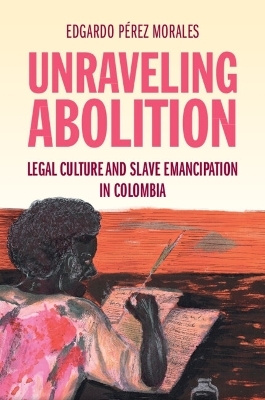
Unraveling Abolition
Legal Culture and Slave Emancipation in Colombia
Seiten
2024
Cambridge University Press (Verlag)
978-1-009-51441-5 (ISBN)
Cambridge University Press (Verlag)
978-1-009-51441-5 (ISBN)
This book focuses on the legal origins of the antislavery movement in Colombia, revealing how slaves, former slaves, magistrates and legal workers called for freedom and citizenship during trials and litigation. A wholly unique study for those interested in slavery and emancipation in the Americas.
Unraveling Abolition tells the fascinating story of slaves, former slaves, magistrates and legal workers who fought for emancipation, without armed struggle, from 1781 to 1830. By centering the Colombian judicial forum as a crucible of antislavery, Edgardo Pérez Morales reveals how the meanings of slavery, freedom and political belonging were publicly contested. In the absence of freedom of the press or association, the politics of abolition were first formed during litigation. Through the life stories of enslaved litigants and defendants, Pérez Morales illuminates the rise of antislavery culture, and how this tradition of legal tinkering and struggle shaped claims to equal citizenship during the anti-Spanish revolutions of the early 1800s. By questioning foundational constitutions and laws, this book uncovers how legal activists were radically committed to the idea that independence from Spain would be incomplete without emancipation for all slaves. This title is also available as Open Access on Cambridge Core.
Unraveling Abolition tells the fascinating story of slaves, former slaves, magistrates and legal workers who fought for emancipation, without armed struggle, from 1781 to 1830. By centering the Colombian judicial forum as a crucible of antislavery, Edgardo Pérez Morales reveals how the meanings of slavery, freedom and political belonging were publicly contested. In the absence of freedom of the press or association, the politics of abolition were first formed during litigation. Through the life stories of enslaved litigants and defendants, Pérez Morales illuminates the rise of antislavery culture, and how this tradition of legal tinkering and struggle shaped claims to equal citizenship during the anti-Spanish revolutions of the early 1800s. By questioning foundational constitutions and laws, this book uncovers how legal activists were radically committed to the idea that independence from Spain would be incomplete without emancipation for all slaves. This title is also available as Open Access on Cambridge Core.
Edgardo Pérez Morales is Assistant Professor of History at the University of Southern California. He specializes in Colombia and its connections with the Caribbean and the Atlantic World. He is the author of No Limits to Their Sway: Cartagena's Privateers and the Masterless Caribbean in the Age of Revolutions.
List of figures; Acknowledgments; List of abbreviations; Prologue: antislavery, abolition, and the judicial forum; 1. Raynal in the new kingdom?; 2. Landscapes of slavery, rumors of freedom; 3. Popayán: prudent legislation; 4. Cartagena: equality and natural law; 5. Antioquia: free womb, captive slaves; 6. An exegesis of liberty; Epilogue: the slaves before the law; Notes; Index.
| Erscheinungsdatum | 17.08.2024 |
|---|---|
| Reihe/Serie | Studies in Legal History |
| Zusatzinfo | Worked examples or Exercises |
| Verlagsort | Cambridge |
| Sprache | englisch |
| Maße | 152 x 229 mm |
| Gewicht | 426 g |
| Themenwelt | Geschichte ► Teilgebiete der Geschichte ► Militärgeschichte |
| Recht / Steuern ► Rechtsgeschichte | |
| ISBN-10 | 1-009-51441-5 / 1009514415 |
| ISBN-13 | 978-1-009-51441-5 / 9781009514415 |
| Zustand | Neuware |
| Haben Sie eine Frage zum Produkt? |
Mehr entdecken
aus dem Bereich
aus dem Bereich
neueste Manipulationstechniken als Waffengattung der NATO
Buch | Softcover (2023)
Westend (Verlag)
24,00 €
Deutschlands Schwäche in der Zeitenwende
Buch | Softcover (2023)
C.H.Beck (Verlag)
18,00 €


